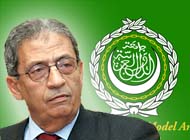Arab League chief: We are facing grave challenge in Lebanon
 Cairo - The Arab League is facing a grave challenge in Lebanon whose complex political standoff has now become a dangerous security crisis, the league chief told Deutsche Presse-Agentur dpa.
Cairo - The Arab League is facing a grave challenge in Lebanon whose complex political standoff has now become a dangerous security crisis, the league chief told Deutsche Presse-Agentur dpa.
"The way out of the current ordeal in Lebanon is for all Arab countries to cooperate. If the crisis continues, it will have grave repercussions on the Middle East," the Arab League Secretary-General Amr Mussa said.
In an emergency meeting held in the Cairo headquarters of the Arab League on Sunday, Arab foreign ministers urged warring Lebanese powers to immediately halt armed violence.
The ministers will send a delegation to Beirut to broker a deal between the Hezbollah-led opposition backed by Syria and Iran and the government backed by Saudi Arabia and Egypt.
The committee, headed by Qatari Prime Minister Jasim bin Hamad and Mussa, is now in contact with the Lebanese leaders to arrange separate meetings and inter-factional ones, Mussa said.
Members of the delegation will all leave for Beirut as soon as its airport is reopened, Mussa added.
"The main task of the committee is to end armed clashes and convince Lebanon's warring powers to immediately return to the dialogue table," Mussa said.
Syria and Saudi Arabia, at loggerheads over Lebanon, are not included in the committee, which fuelled speculation that deep divisions have marked Sunday's meeting just as they did in the last Arab summit in Damascus in March.
"There are no differences. Everyone agrees on the urgent need to resolve the Lebanon crisis. There is a minor disagreement on the way to solve it," Mussa noted.
"There were no conditions for participation in the committee. Whoever wanted to take part in the committee, did so. The door is open for all to participate," he said.
Saudi Arabia, Egypt and their Lebanese allies from the governing coalition have accused Syria of obstructing efforts to broker a deal to end the current standoff.
Syria, which did not send its foreign minister to the Cairo meeting, said the Lebanese crisis was an internal Lebanese matter.
In 2005, Syria was forced to pull its troops from Lebanon, ending three decades of political and military domination.
Playing down inter-Arab differences, Mussa said Syria and Lebanon had strong ties.
"One should not be mixed up about the fact that what is happening in Lebanon is an internal Lebanese crisis," Mussa said.
"Syria should not blamed for this. This accusation is being promoted by foreign powers that have an interest in sowing differences between Arab countries," Mussa maintained.
The league chief blamed foreign powers, he did not name, for "meddling in Lebanese affairs and influencing some Lebanese parties," leading to a political stalemate and an end to inter-factional dialogue.
Arab countries are polarized over which foreign powers to blame for the current crisis. Saudi Arabia, Egypt and the Lebanese government are blaming Iran and Syria while Syria is blaming the US and the west.
Mussa denied that the final statement issued by Arab foreign ministers Sunday implicitly criticized Hezbollah for the escalation of violence in Lebanon.
Mussa said the statement rejected the use of force by all factions to achieve political goals.
The Arab League does not address messages with a certain meaning to certain parties, Mussa maintained.
"If we wanted to do so, we would do directly without circumventions," he said.
The Arab League was opposed to any UN resolution over Lebanon that would blame one party and not the other since all powers have a role in the Lebanon crisis, Mussa said. (dpa)